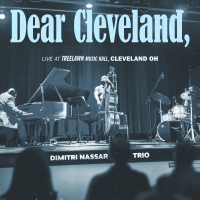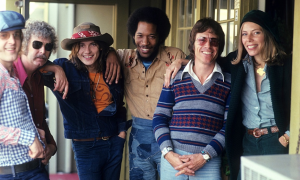Home » Jazz Articles » Profile » Barry Harris in New York
Barry Harris in New York
But for forty-some years, no matter where he's been, Harris always looks forward to coming home to his apartment off of Boulevard East in Weehawken, New Jersey. "I've lived here for about 40 years. It's a nice town, and of course it's close to New York, so I can get over there and do my gigs and classes when need be. The apartment was part of a house once owned by Baroness Pannonica de Koeningswarter, a great patron of jazz musicians. And if those walls could talk, what a tune they'd play.
Harris remembers the day his close friend, Thelonious Monk, the iconoclastic jazz pianist and composer, dropped by for a visit. "Monk rang my bell one day, came in, laid down in my bed and stayed for ten years. Harris said. "He didn't always want to play piano around that period of his life, he was going through stuff. But when he did feel like playing we'd have a ball. Once we sat here and played the song "My Ideal . We played it over and over. He'd play a chorus and I'd play a chorus. It's a shame that this wasn't recorded 'cause we must have played over 50 choruses everyone slightly different ...it was a gas.
Today at age 76, Dr. Harris (he holds an Honorary Doctorate from Northeastern University) still takes music lessons to fine tune his technique. He was recently honored last month by the National Academy of Recording Arts & Sciences along with Oscar Peterson and Hank Jones for outstanding achievement and contributions to the jazz genre and the music community. But to really know Harris you have to go back to Detroit where he was born.
His mother started teaching him to play piano when he was just four years old, and his musical education continued over the next two decades with private teachers—mainly focused on classical music. But it was hearing Charlie Parker play one night in the late 1940's in a Detroit ballroom that transformed Barry Harris. "I loved Bird from a very early age. He wasn't that accessible at that time; it was almost like a secret society. So we would go hear him play at dances; we could get into dances. There were these ballrooms all over Detroit.
Harris heard Bird playing saxophone that night accompanied by a string section, and it changed everything Harris thought he knew about music. "When I heard Bird that night with strings and you know felt this feeling, this overpowering feeling, that not only transformed me, but it messed me up. Because I kept looking for that feeling I got from Bird that night and I never found it listening to anyone else. What I finally realized is that one had to give this feeling to oneself. And if one can get outside of oneself you can sometimes give that feeling to other people—that's what I try to do with my music and teaching.
Harris' family home in Detroit soon became Jazz Central for every young serious player in town—like Roland Hanna, Sonny Red, Donald Byrd, Harold McKenny, each who later went on to have big careers. Harris says his mother extended her famous hospitality (all hours of the day and night) to scores of other young players—some who later helped create Motown Records. "See, what people don't know is that Motown was created by jazz musicians. Barry Gordy (the creator of Motown records) went to school with me. We were boogie-woogie piano players together in high school. He came out to California a few weeks back and sat next to me when I got honored by the Grammys.
It was in New York City in the 1960s when Harris realized that teaching jazz was just as important to his art as playing jazz. He recalls his first week of teaching at a music center called Jazz Interaction when he forgot to show up for class. "Here's what happened, he said. "I went to off-track betting; I like to play the horses. I forgot all about that I was suppose to teach that day. Then I remembered. I jumped into a cab and raced over to the place. When I got there, I was two hours late. But the entire class was still there waiting for me to show up. Since then Harris has not stopped teaching. He travels the world as a guest lecturer and conducts Master Classes. Currently he is teaching jazz piano improvisation and theory and jazz singing classes in New York City.
Dan Morgenstern, the Director of the Institute of Jazz Studies at Rutgers University and former chief editor for Down Beat Magazine for seven years simply thinks that Barry Harris is a one-man musical force. "Barry is one of the great jazz educators ever—maybe not in the true academic sense but probably much more effective. Barry, in a way, is a one-man jazz movement and is somebody who is a true keeper of the jazz flame. When jazz was in a low ebb in the 1960s, Barry carried on and I remember that he was one of the only, or maybe the only player, who could be heard playing jazz in Harlem at that time.
As for the future of jazz, Barry hopes for the best, but he's worried about the lack of media attention—especially programming geared to the younger generation. "I mean we have been completely ignored as an art form of late. We haven't been on television in prime time; we have nothing. But I think that Wynton Marsalis (the leader of the Lincoln Center Jazz Orchestra) is helping to keep jazz alive.
And there are some other bright spots as well, says Harris. "I got to say we have some Rock & Roll cats that are out there doing jazz and bringing it to a larger audience again, like Rod Stewart. But Harris, being the teacher that he is, has a few pointers for Mr. Stewart. "I sure would love him to come to my house so I could teach him how to do some of this singing of the standards. He's not a bad singer, but his phrasing and breathing need a little work. I'm sure it won't be long when I'll be somewhere playing a great standard like "Just the Way You Look Tonight, and all these young kids will say, 'Hey, that's a Rod Stewart song.'
Selected Discography
Live In New York (Reservoir Music, 2003)Listen to Barry Harris...Solo Piano (Original Jazz Classics, 1961)
Barry Harris At the Jazz Workshop (Original Jazz Classics, 1960)
Tags
PREVIOUS / NEXT
Support All About Jazz
 All About Jazz has been a pillar of jazz since 1995, championing it as an art form and, more importantly, supporting the musicians who make it. Our enduring commitment has made "AAJ" one of the most culturally important websites of its kind, read by hundreds of thousands of fans, musicians and industry figures every month.
All About Jazz has been a pillar of jazz since 1995, championing it as an art form and, more importantly, supporting the musicians who make it. Our enduring commitment has made "AAJ" one of the most culturally important websites of its kind, read by hundreds of thousands of fans, musicians and industry figures every month.

























